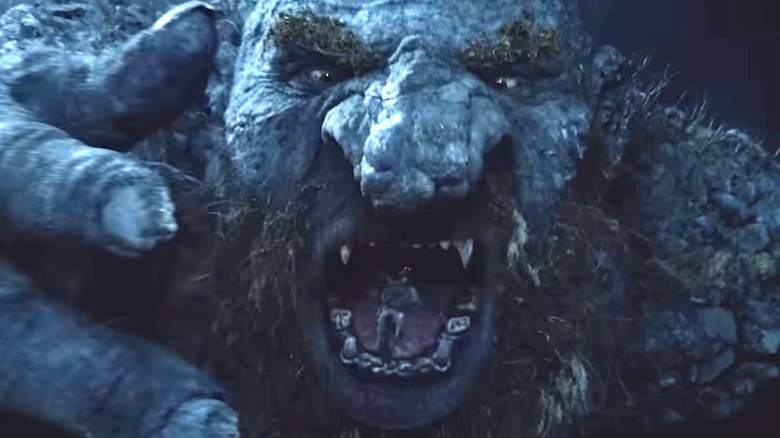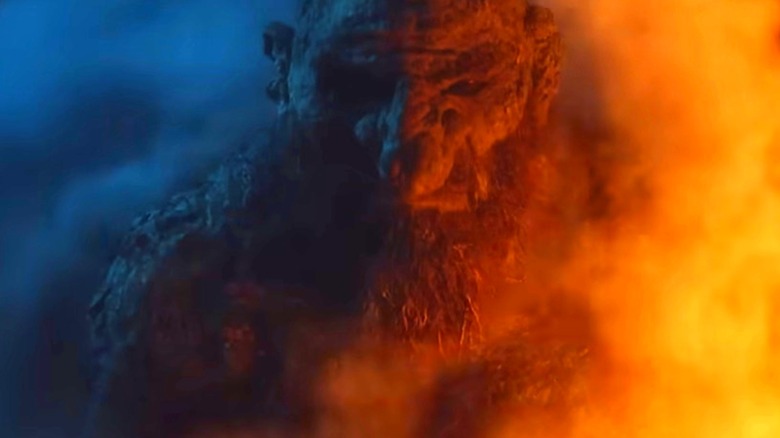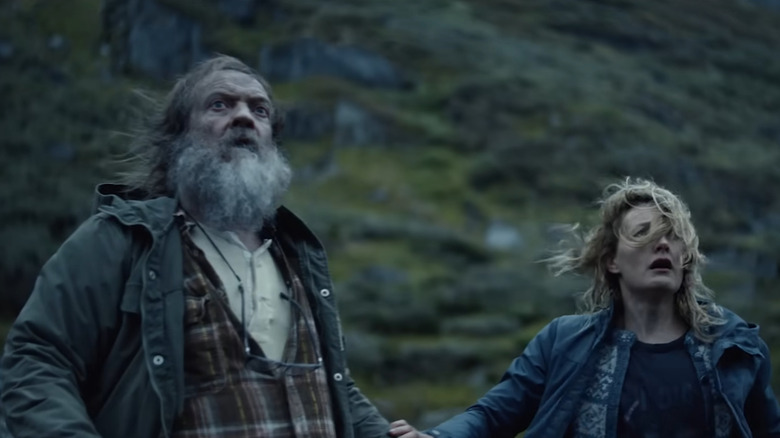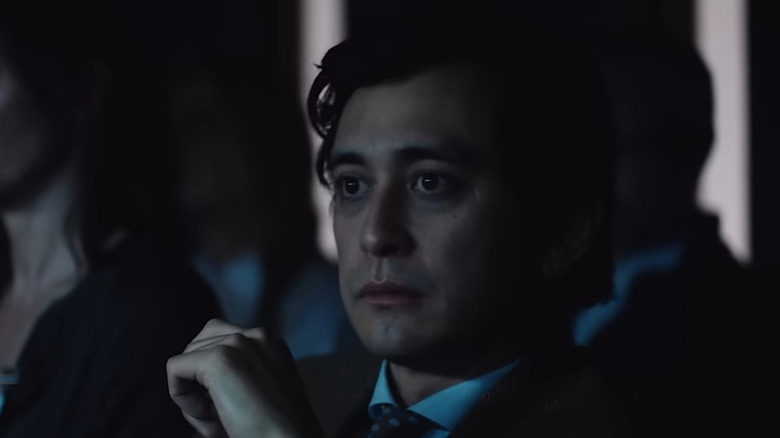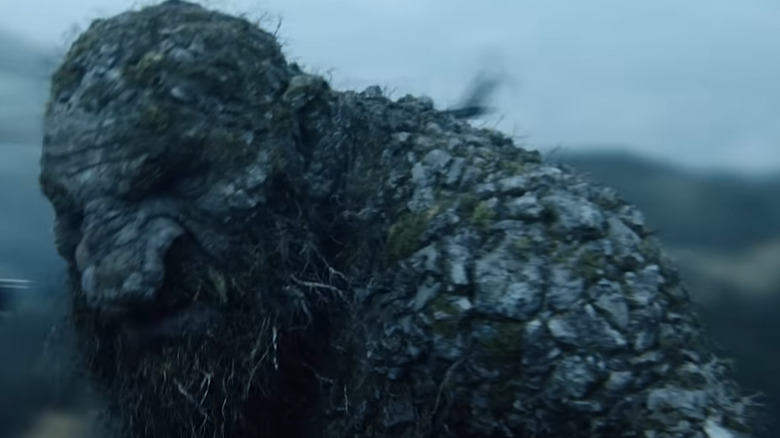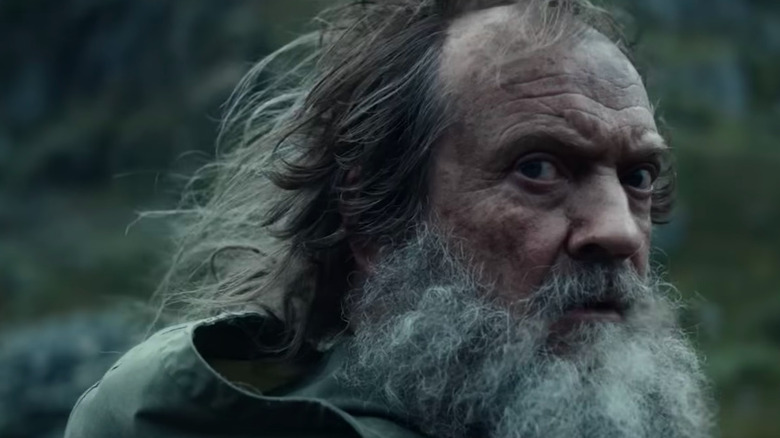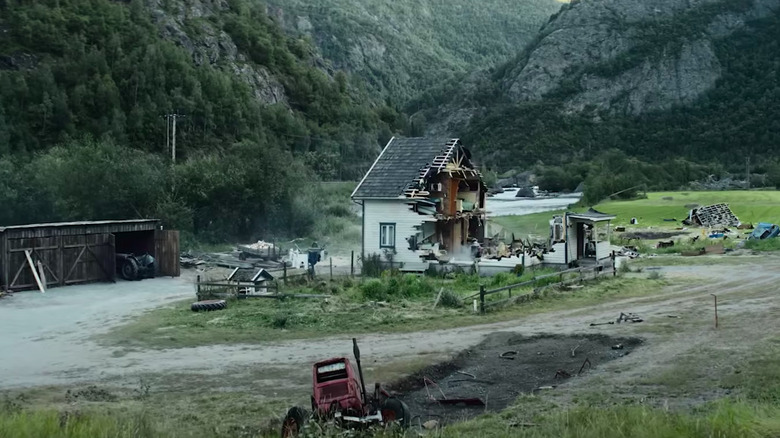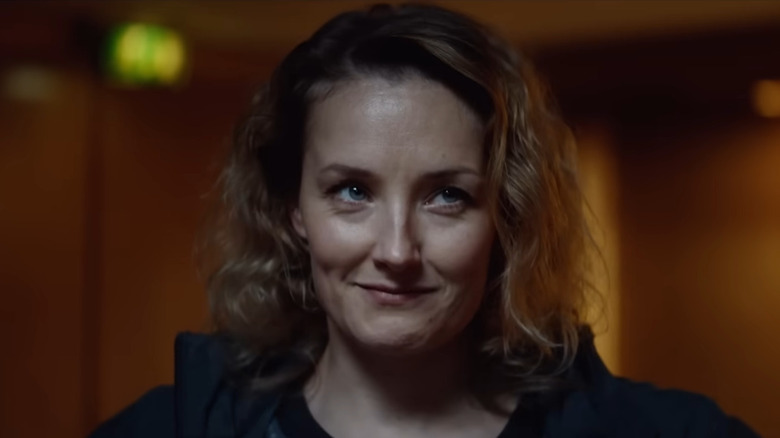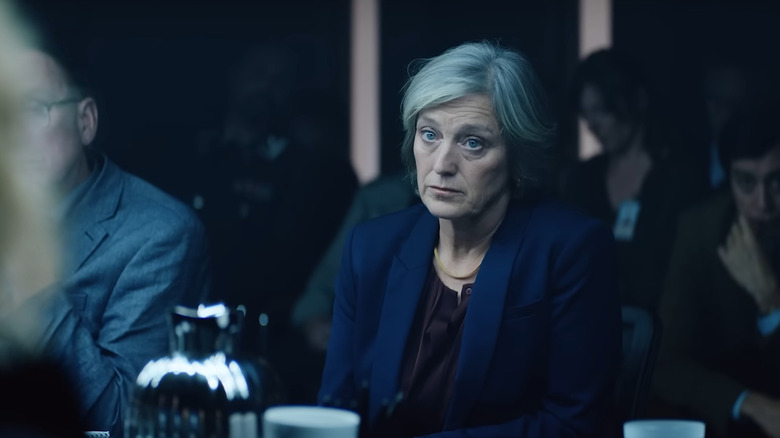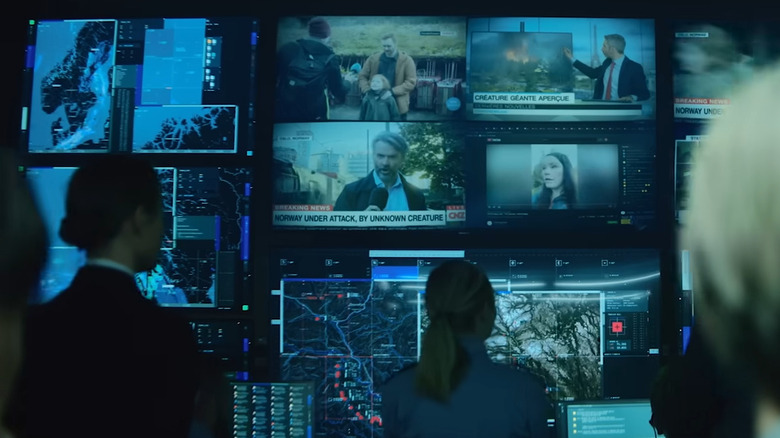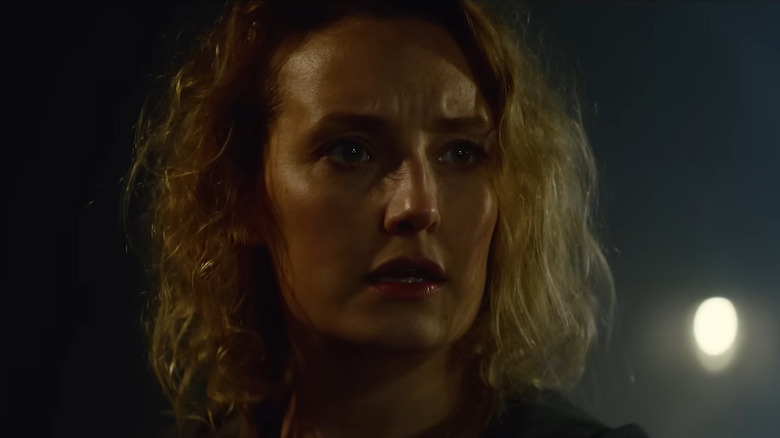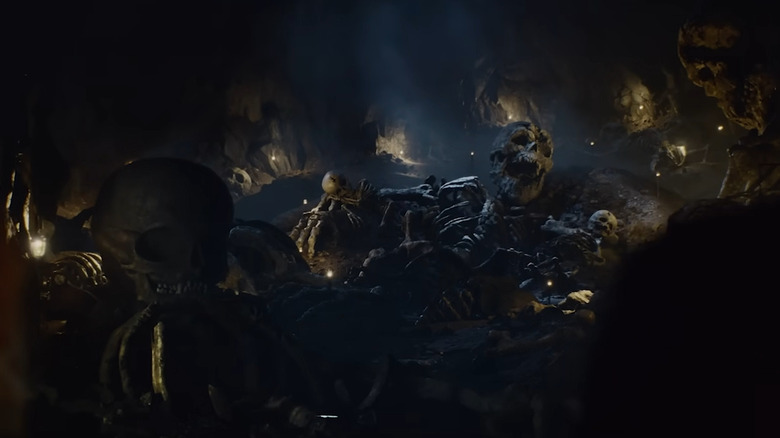The Ending Of Netflix's Troll Explained
This article contains spoilers for "Troll."
Did your career path turn out like you thought it would, or slightly different? Do you find it easier or more difficult to connect with your parents the older you get? Would someone be able to convince you that ancient folklore is real? These are questions that the 2022 Netflix film "Troll" asks its audience to consider as it takes viewers along for a dark tale about ambition, parenthood, and skepticism.
"Troll" is directed by Roar Uthag, who previously helmed 2018's "Tomb Raider" and 2015's "The Wave." In "Troll," Uthag evokes a moodiness that matches his subject. It's believed that the trolls of legend couldn't survive in sunlight, and the film lives up to this lore with a color palette that's decidedly cold, cloudy, and fluorescent. These lighting cues go hand in hand with the narrative, which only ever infuses sunlight into the landscape in its final scene, when our characters have incidentally arrived at their moments of internal transformation. Underneath the surface level of "Troll," which might seem predictable upon first glance — "monster attacks city" is hardly an original or intricate concept — there are ideas that dig a little bit deeper by the time the credits roll.
Believe
There are scores of films that introduce a monster or fantastical creature into a world that is otherwise completely grounded in reality. An inevitable plot point becomes the characters' reaction to this creature existing and them getting over the hurdle of thinking it's merely fiction. Such is the case with "Troll," which spends a great deal of its runtime convincing its characters of its own mythology.
The Norwegian government enlists professional assistance from Nora Tidemann (Ine Marie Wilmann) in identifying the source of massive footprint-shaped markings. Nora's father, Tobias (Gard B. Eidsvold), insists they're not just footprint-shaped, but actual footprints, belonging to a troll. As a little girl, Nora used to love her father's tales of Norway's trolls, but now she takes a more logical approach to life. In the end, though, Tobias is right.
In a way, this component of "Troll" almost mirrors a variation of the archetype seen in many Christmas films in which characters begrudgingly deny Santa's existence, only to eventually come around in the end and believe in him. The difference in "Troll," though, is that the payoff for its fantasy being real all along isn't some fluffy, warm holiday moment. For the characters in "Troll," accepting the reality that trolls exist means facing a very real threat to the natural order of their world. It's an eerie juxtaposition to consider the fulfillment of childhood fantasies equating imminent doom.
Relationships changing as time goes on
Relationships between kids and their parents can become complicated as kids become adults. Nora used to hang onto Tobias' every word as they adventured together across the mountains. They imagined themselves as heroes of a fictional quest called "The Adventures of Big and Tiny," and these moments together were the core of their relationship. Following the death of Nora's mom, though, Nora and Tobias grew apart. The action of "Troll" begins years after this incident, in time to see them somewhat make amends, just before the troll kills Tobias. Nora spends the remainder of the film grappling with the concept of her father's legacy and how much of his life's mission to put stock in.
Within the ebb and flow of Nora's relationship with her father, the audience might consider their own relationships with their parental figures. What leads to estrangement of family members who were once so close? How does one approach reconciliation when both parties are responsible for the falling out? How does one honor the memory of a lost loved one when they may not fully believe in everything the person stood for? Nora finds closure and healing in her relationship with Tobias in the wake of Tobias' death. Even if Tobias didn't live to see Nora come around to his point of view, his preparation while still living made it possible in the first place, fulfilling his mantra that "the incredible isn't impossible."
Speaking up from the sidelines
Andreas (Kim Falck) is the prime minister's assistant. He keeps the prime minister's schedule on track and is involved in most of her day-to-day activities — but stays noticeably and intentionally on the sidelines. To compare Andreas to Dwight Schrute, this is definitely an "assistant to the regional manager" rather than "assistant regional manager" situation.
Despite this, Andreas occasionally speaks his mind, even if the situation doesn't directly call for his input. As the prime minister reviews footage of the troll's footprints while the markings' origins are still unknown, Andreas suggests to her that they look foot-shaped, before quickly apologizing for interjecting his own observation. Later, in a room full of government officials, Andreas sits in an outer circle of chairs against the far edge of the wall, away from the people participating in the conversation around a conference table. Despite this, he speaks up, again suggesting the markings' resemblance to footprints, and it's this remark that begins to turn the tide of the group's actions.
Andreas is a consistent reminder throughout "Troll" that an individual's influence should not be dictated by the assumed level of status (or lack thereof) that might be associated with their station of work. Andreas is an assistant, and yet in the fight to save the country from the troll's destruction he proves to be one of the most valuable voices involved. Without him, many more people would have died. Influence can come from anywhere and anyone.
Beating critics to the punch
Monster in the woods shows itself to one character. Character tells everyone else, but no one believes them. Monster shows itself to all. Character is vindicated, but others fear the monster. Despite the character's pleas to be nice to the monster, others provoke it and make it angry. Monster attacks. Have you seen this movie before?
An easy criticism of "Troll" might be to say it borrows too much from similar monster disaster movies. Getting ahead of this, the film actively acknowledges its awareness of the traits it shares with other films. In the government briefing room, someone compares the troll to King Kong. When searching for traces of the troll in a mountainous valley, one character remarks how it feels like they're searching for dinosaurs, akin to "Jurassic Park." A news anchor compares the troll's attacks to Godzilla. The fact that "Troll" includes these references could perhaps help its premise feel like an homage to what came before rather than a rip-off.
Having a healthy imagination vs. losing touch with reality
As a mountaineer who mostly keeps to himself and whose knowledge of trolls ends up being correct, Tobias' arc proves to be an interesting character study in, as his daughter Nora puts it, the difference between having an imagination and losing touch with reality.
Tobias lives alone in the middle of nowhere. The walls of his house are plastered with maps and newspaper clippings as if he's tracing a crime, and he indignantly implores everyone to believe that trolls are real. It's conspiracy theorist 101— except that in this case, Tobias' hunches aren't theories at all. He's correct in his assumptions, lending a nuanced thematic layer to the story.
Despite Tobias' expertise about the lay of the land in which the troll's markings were spotted, everyone is quick to write off his claim that the markings actually belong to a real troll. Later, of course, they realize that the seemingly crazy guy had been right all along. (Not only that, but history was much darker than even Tobias thought, with the entire troll race being eradicated and buried underground, with only one of them remaining alive.) What are the repercussions of labeling someone too quickly? How does a fundamental change in a philosophical perspective shift one's approach to life going forward? These questions hit Nora hard, especially in the aftermath of her father's sudden death.
A lot of destruction could have been avoided
As Tobias attempts to approach the troll calmly, members of the Norwegian military immediately engage it in combat, prompting retaliation from the troll. This sets into motion the entire second half of the film, effectively becoming a troll vs. humans war. In retrospect, one can't help but wonder how the ending would have been different if the military personnel had resisted the urge to take that first shot. Surely the troll wouldn't have killed Tobias moments later. How much progress would Tobias have been able to make in his effort to begin friendly relations with the troll, maybe even leading to a new era of society?
The incident brings to mind the implications of handling conflict in different ways. Tobias advocates for trying to see the troll as a living creature and empathizing with it before immediately resorting to combat. While admittedly a big leap for others to make when the troll is capable of destroying everything in its path, their assumptions about the troll's intentions become a self-fulfilling prophecy. Since they believed the troll would harm them, they tried to hurt it before it got the chance, and in doing so created the monster they feared. It didn't have to be that way.
The trajectory of a career path
Nora's dreams were as fantastical as her father's when she was a little girl. As an adult, though, she pursues the more grounded, scientific version of troll-chasing by being a paleontologist. The role translates Nora's childhood fantasy into a career, but it's based more on rationale and logic than what was previously an unbridled love for adventure. Similarly, Andreas has dreams of being a writer, but life's gotten in the way and his current station is assistant to the prime minister. It's certainly a dignified job, but it's got nothing to do with his true passion.
Nora's career as a paleontologist and Andreas' career in the Norwegian government are both different from how they thought their adult lives would end up. Toward the end of the film, Andreas quits his job to pursue writing, perhaps the ultimate embodiment of the 180 an artist's journey sometimes takes. There's no concrete indication that Nora will quit paleontology, but she's definitely been philosophically changed by her experience with the troll, and even if she stays in the same profession, she will undoubtedly approach it differently.
As both characters step forward into new chapters of their lives, they are examples of contrasting choices that the audience can perhaps relate to: finding a solution to restlessness by deciding that a drastic change is in order (Andreas) or deciding to do the same thing in a new way (Nora).
Government secrets — gasp!
In discussing how to eliminate the threat of the troll upon Norway, Prime Minister Berit Moberg (Anneke von der Lippe) meets with military personnel. They inform her that nuclear missiles are an option, which Moberg is startled to learn are available and asks why she wasn't informed about their existence earlier. Untested and not fully ready for use, the missiles would put nearby civilians in harm's way if deployed. This information, of course, is spared from public disclosure, painting a picture of a government that isn't completely honest with its citizens, and at times isn't even completely honest with its own leaders.
During the climax of the film, the missiles are inevitably authorized, but Sigrid (Karoline Viktoria Sletteng Garvang), a low-ranking government employee and a friend of Andreas, sabotages the plan at the last moment, saving countless lives. Sigrid breaking protocol to stand up for what she believes in follows the typical movie formula of an underdog giving a corrupt government what-for, a signature move of disaster films.
Elsewhere, the government is able to hack into a random civilian's phone to obtain a video with evidence of the troll's existence. An employee mentions the hack was complicated, but not impossible. Throughout "Troll," the government almost acts as a character unto itself, aligning with the dark, overreaching personality that many films assign to governments of any country.
The origins of misinformation
Tobias notes that folklorists made up lies about trolls to always depict them negatively in generations-old stories, which led to stereotypes against the creatures. In the present, these generalizations undoubtedly lead to many of the humans' assumptions about the last remaining troll when they discover its existence. As Tobias shares with the group how the folklorists' cruel descriptions of trolls were not accurate, Andreas reflects, "If you tell a lie enough times, people will take it as the truth."
It's an applicable social commentary that's sure to be noticed by the audience, especially in an age when misinformation spreads like wildfire. A tidbit of inaccurate news is often accepted as fact, even if it doesn't come from a reputable or verified source, and the spread of the falsity can sometimes cause unwarranted hysteria. Perhaps smartly, the script refrains from having Andreas interject any specific example into his introspection — he doesn't, for example, insert a topical reference to COVID-19 or an election — which might've tipped the point toward being more distracting than effective. Instead, the viewers can simply fill in the blanks themselves.
No chance for the hard choice to play out
By the film's climax, all of Tobias' hypotheses about the trolls have turned out to be true. Even in death, his knowledge guides Nora's mission, and in a crucial moment she remembers one last bit of info that could help defeat the troll for good. In folklore, trolls are averse to sunlight. Nora realizes that while she's seen the troll during the daytime, the sky has always been cloudy. The sun has never been out at the same time as the troll, so there's reason to believe that the old belief might be true. Even though it's nighttime, if she can lure the troll to an area where artificial sunlight can shine in its face, she just might save everyone from the troll's destruction. Her plan works, but she soon puts two and two together to discover the light won't stop the troll without killing it. Nora pulls the plug on the operation to kill the troll at the last minute, wanting to follow in her late father's footsteps and try to approach the troll peacefully.
The repercussions of this choice, while noble and the right thing to do, would have no doubt been a much harder path forward. The community at large would face major societal roadblocks in how to communicate with and accommodate the coexistence of humans with the troll in a polite symbiosis, which surely would also have its fair share of naysayers to deal with. It would change everything. Regardless, Nora's heroism is rendered null when the sun immediately rises and kills the troll. The story redeems Nora's intentions while still taking the easy way out.
Another troll
A plot point that's central to the entire film is that the troll roaming about is the last of its kind in existence. This discovery is what makes the cover-up of the underground mausoleum of troll skeletons semi-plausible. It also helps Nora and the audience lend a greater sense of empathy to the troll. If it's the only one left, of course it's lonely and it makes sense that it would be confused and destructive. It has no one, and it's this train of thought that leads to Nora wanting to save it in the end.
A mid-credits scene indicates there's at least one more troll alive, with the camera showing a giant creature violently emerging from seemingly the same cave where the original troll came from. This twist, while leaving the door wide open for a sequel, should one be produced, paints the narrative of most of this first film in a different light. If there was more than one troll all along, then much of the explanation that the movie provides for its narrative needs revising. This would surely be explained should a follow-up come about, but it would feel a bit odd considering the lengths to which the first film goes to establish its lore. (A potential sequel would also be smart to think of a different name than the most obvious choice, as "Troll 2" would prompt mass confusion with a notorious film of the same name, cited by many as the worst movie of all time.)
